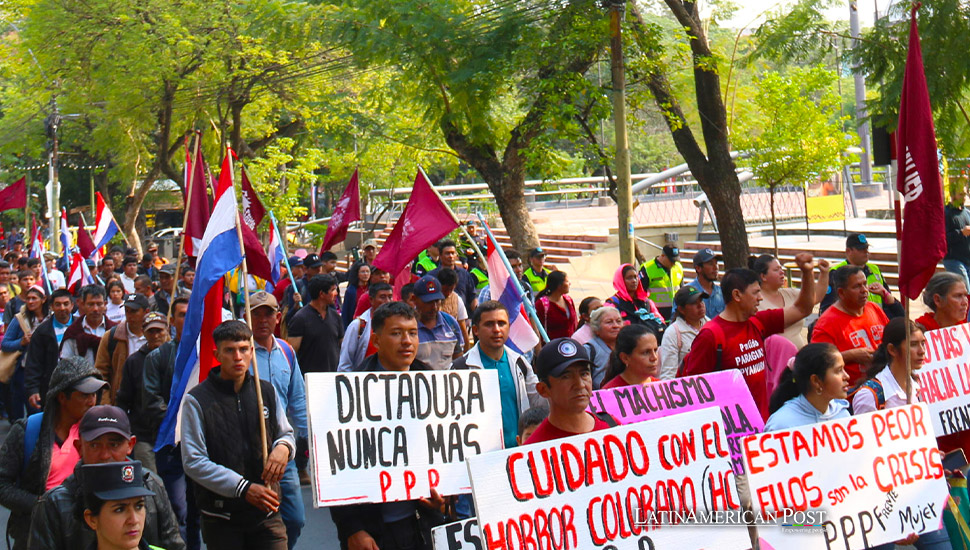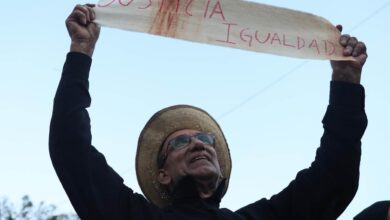Paraguay Protests Call for Employment and Social Reform

On the first anniversary of President Santiago Peña’s administration, hundreds of Paraguayans took to the streets of Asunción, demanding social policies that address unemployment and agricultural challenges. Protesters argue that macroeconomic stability has not translated into tangible benefits for the populace.
On August 15, 2024, as President Santiago Peña marked his first year in office, the streets of Asunción were filled with the voices of discontent. Hundreds of Paraguayans, from rural farmers to urban workers, gathered to protest the government’s failure to address pressing social and economic issues. Under the slogan “We are worse off, they are the crisis,” the demonstrators expressed their frustration with what they see as a disconnect between the country’s macroeconomic achievements and the reality faced by ordinary citizens.
The Partido Paraguay Pyahura (PPP) organized the protest, a political movement deep-rooted in the country’s rural communities. Ermo Rodríguez, the party’s general secretary, spoke passionately about the struggles of small-scale farmers, students, and families who feel neglected by the current administration. “Here are small producers who cannot sell their products, young people who want to study and work but cannot, and many families who go to health centers and find no solution to their ailments,” Rodríguez told EFE.
The frustration expressed by Rodríguez and the protesters highlights a growing divide in Paraguay. While the government touts its success in maintaining macroeconomic stability, these statistics offer little comfort to those grappling with poverty and unemployment. According to the Instituto Nacional de Estadística (INE), the total poverty rate in 2023 stood at 22.7%, with unemployment reaching 6.4% in the second quarter of 2024, up from 5.8% in the same period the previous year. Furthermore, a staggering 62% of the employed population in 2023 worked in the informal sector, reflecting the precarious nature of employment in the country.
Rodríguez’s call for land reform, industrial development, and increased investment in health, education, and housing underscores the protesters’ demands for policies addressing the nation’s structural issues. “What good is maintaining macroeconomic stability if the majority live in poverty, misery, and need? This is highly contradictory, and state policies are needed to transform this reality,” Rodríguez argued.
Economic Growth vs. Social Realities
Paraguay’s economy is projected to grow by 3.8% in 2024, positioning it as the second fastest-growing economy in South America, behind Venezuela. The government often cites this optimistic outlook, as forecasted by the Economic Commission for Latin America and the Caribbean (Cepal), as evidence of the success of its economic policies. However, the protesters in Asunción are challenging this narrative, pointing out that economic growth has not translated into improved living conditions for many Paraguayans.
The disconnect between economic indicators and social well-being is at the heart of the protesters’ grievances. Despite the anticipated growth, the benefits of this economic expansion have been unevenly distributed, leaving a significant portion of the population struggling to make ends meet. The rising cost of living, particularly the increase in prices of basic goods, has further exacerbated the situation, leading to what many see as a deepening crisis of inequality.
Former opposition senator Kattya González, who was controversially removed from office by the ruling Colorado Party, joined the protest in Asunción. González, who has been an outspoken critic of the Peña administration, echoed the sentiments of the protesters, accusing the government of rolling back social progress. “This is a year of government that has only brought setbacks, leading to the definitive delay of all that represents the advancement of social policies,” she told EFE. González also highlighted the rising cost of basic necessities, which she argues has contributed to the impoverishment of many Paraguayans.
The protesters’ demands for a more equitable distribution of the country’s economic gains reflect a broader concern about the direction of Paraguay’s development. While macroeconomic stability is important, they argue that it must be accompanied by policies that directly address the needs of the most vulnerable populations. Without such measures, the economic growth touted by the government risks becoming an empty achievement, one that fails to improve the lives of those who need it most.
Calls for Land Reform and Industrial Development
One of the central demands of the protesters is comprehensive land reform, a longstanding issue in Paraguay where land ownership is highly concentrated in the hands of a few. Small-scale farmers, many of whom participated in the protest, are calling for greater access to land and resources to sustain their livelihoods. The PPP’s Ermo Rodríguez emphasized the need for agrarian reform to ensure that farmers have the land and tools necessary to increase agricultural production and improve their economic situation.
The call for land reform is not new in Paraguay. For decades, rural communities have struggled against a system that favors large landowners and agribusinesses at the expense of small farmers. The lack of access to land has been a major barrier to reducing rural poverty and promoting sustainable development in the country. Rodríguez and the PPP argue that without meaningful land reform, the government’s promises of economic growth will remain out of reach for the rural poor.
In addition to land reform, the protesters are advocating for the development of industrial complexes to create jobs and stimulate economic activity. The emphasis on industrialization reflects a desire to diversify Paraguay’s economy, which is heavily reliant on agriculture and vulnerable to fluctuations in global commodity prices. By investing in industrial development, the protesters believe that the government can create more stable and well-paying jobs, reducing unemployment and underemployment, particularly in rural areas.
The demand for increased investment in health, education, and housing also featured prominently in the protest. The protesters argue that these sectors are critical to improving the quality of life for all Paraguayans, particularly those living in poverty. They are calling on the government to prioritize these areas in its policy agenda, ensuring that the benefits of economic growth are shared more equitably across society.
The Threat of Authoritarianism and the Struggle for Democracy
Beyond economic and social issues, the protest in Asunción also raised concerns about the state of democracy in Paraguay. The PPP and other opposition groups have expressed alarm over what they see as the rise of authoritarianism under President Peña’s administration. In a statement released during the protest, the organization warned of the “emergence of authoritarianism” and the use of state power to “punish dissenting voices.”
The removal of Kattya González from her position as senator is seen by many as a troubling sign of the Peña administration’s willingness to silence opposition. González was ousted by the ruling Colorado Party on charges of “improper use of influence,” a move that was widely condemned as politically motivated. The Ministry of Public Prosecution declared the decision unconstitutional, but the incident has nonetheless heightened fears of a crackdown on political dissent.
González herself has been a vocal critic of what she describes as the government’s attempts to undermine democratic institutions. During the protest, she spoke out against the Peña administration’s policies, which she argues have led to social and economic regression. Her participation in the protest highlights the broader struggle for democracy in Paraguay, where opposition leaders and civil society groups are increasingly concerned about the erosion of democratic norms.
The protests in Asunción reflect a growing discontent with the Peña administration, not only over its economic policies but also its approach to governance. As Paraguay marks the first anniversary of Peña’s presidency, the country finds itself at a crossroads. The demands for social reform, land redistribution, and industrial development, coupled with fears of rising authoritarianism, suggest that the coming years will be crucial in determining the future direction of the country.
Also read: Paraguayan Air Force Bolsters Fleet with Brazilian Embraer’s A-29 Super Tucano Aircraft
The protests in Paraguay underscore the urgent need for President Peña to address the deepening social and economic inequalities that have fueled discontent across the country. While the government may celebrate its macroeconomic achievements, these accomplishments ring hollow for those struggling to survive. The voices of the protesters in Asunción are a powerful reminder that true progress requires not just economic growth but also a commitment to social justice and democratic principles.




